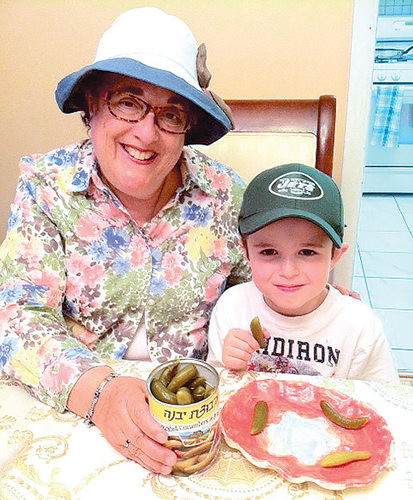

Achi is a Hebrew word that means my brother. ACHI is also an acronym for the non-profit group American Communities Helping Israel. And the two are intertwined: The goal of the organization is to help our brethren in Israel by encouraging people to buy made-in-Israel products.
ACHI was founded by Suzanne Weilgus of Monsey, an educator with an MBA in healthcare administration, with a team of like-minded volunteers from the area: Rochelle Zupnik, an educator and marketing specialist; Gloria Gordon, an MSW who works with youth and families, an Lynda Zentman, Principal of Bais Yaakov D’Rav Hirsch.
Zupnik said ACHI was formed after the women visited Israel fairs held around New York and New Jersey to give the Israeli economy a boost, and wanted to find a way to keep the momentum going. “The fairs were very successful, but they came and went,” Zupnik said. “We brainstormed about what we could do to create a not-for-profit geared to a multi-age group, which would come up with easy-to-implement ideas to keep people connected to Israel.” ACHI was the result.
ACHI began by introducing projects for school children. “When we reach children at a young age, it helps create commitment and they bring the message home,” Zupnik said. Their first project, Israeli snack day, has caught on with many day schools. During the first week of school, a class votes on a day when the students can bring in any snack made in Israel.
Last year, ACHI began “The Klee” project: Families designate a bowl—klee is “vessel” in Hebrew—to be filled with Israeli products. By displaying your Klee prominently on your table and desk, and always keeping it filled with Israeli edibles, you are showing your family, guests, students, and colleagues the importance of Think Israel – Buy Israel,” Zupnik explained. She recommends having several Klees—one for Shabbos, one for every day, and one for all your Dead Sea skin care items. A Klee can be simple or elaborate; something you already have or a new item you choose just for this purpose. ACHI made up Klee cards for spreading the word to friends and displaying with your Klee at home.
Last year, Zupnik’s granddaughter, Miri Hochberg of Teaneck, made a Klee in the ceramics club at the Rosenbaum Yeshiva of North Jersey. This year, making a Klee will be a schoolwide project. Leah Silver, eighth-grade girls’ Jewish Studies teacher and Jewish Programming Studies Facilitator, said the Klee idea fits in beautifully with their curriculum of teaching laws and values. “Students will be using paper and cardboard to make some form of container to remind them to keep Israel central in their lives,” Silver said, “especially during this shmitta year, when farmers must keep the land fallow, the Klee is something each child can take home to keep Israel in mind.” ACHI is having discussions with the other day schools in Bergen County to implement Klee projects in their curriculum.
And what can you put in your Klee? “We recommend filling your Klee with consumable products from Israel: wine, condiments (olives and pickles), candles, and cheeses, snack foods, desserts, olive oil, and more,” Zupnik said.
Most kosher grocery stores and, increasingly, bigger supermarkets, carry Israeli products. There are also a few stores in Bergen County that specialize in Israeli products.
Kfir Sayag opened Tenafly’s Emanu-El delicatessen, specializing in imported Israeli products, four years ago after running a similar store in Queens. “I decided to come here to provide for all of Bergen County,” Sayag said. “I met so many Israelis from this area who came to Queens to shop.”
Sayag imports his stock directly from Israel, selecting many items that are not found in the bigger markets. In addition to shelves filled with canned and boxed goods, he carries hard-to-find items like certain brands of Israeli flour or styles of Emek cheeses. He has many frozen items and bins filled with Israel olives and pickles. Behind the counter, a fountain container dispenses Israeli-style frozen blended ice coffee “like at Aroma,” Sayag noted. There is a small area where you can order sandwiches and salads. Emanu-El doesn’t have a mashgiach, but all food is kosher and the meats are Glatt Kosher from Brooklyn.
Sayag provides more than just the right products; he gives customers a link to Israel. When I was there, a steady stream of men, women, and children came in and chatted with Sayag as they made their purchases. Leeron Benesh, a frequent shopper at Emanu-El, grew up in Israel and moved to Demarest 19 years ago. “This is a taste of home. I can get things here I can’t get at the supermarket—they may have tahini but not the right one,” Benesh said.
Sayag smiled. “I get to know my customers and what they want,” he said. “This type of relationship you won’t find at a supermarket.”
I guess you can’t put your frozen blended coffee in a Klee, but you can sip it while putting in any of Emanu-El’s numerous Israeli consumables.
To learn more about Israeli products and where they are available, visit
www.BuyIsraelGoods.org. The site helps you find Israeli products by category, and has a geographical list of retailers throughout the US. For more information about ACHI and “The Klee,” visit www.achi613.org.
By Bracha Schwartz









